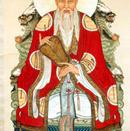Throughout history, Taoism has been one of the most influential
religions of Eastern culture. This is certainly one of the most unique
of all religions. Many Taoists, in fact, do not even consider it a
religion; and in many ways it is not. Taoists make no claim that the
Tao exists.1 That is what essentially separates Taoism from the rest of
the world religions: there is no heated debate or battle over Taoist
doctrine; there have been no crusades to spread the religion. The very
essence of Taoism is quite the opposite. Taoism's uniqueness and
open-endedness have allowed the religion to flourish almost undisturbed
and unchanged for over two thousand years.
The founder of Taoism was a man named Lao Tzu, who lived around the
year 604 B.C.E. According to Chinese legend, Lao Tzu was an archivist
in the imperial library at Lo Yang was known for his knowledge, although
he never taught.2
When Lao Tzu left his position at the library, he
went to the Chinese province of Chou. At the border, however, he was
stopped and forced to write down his teachings. During this time, he
wrote the Tao Te Ching, the major scripture of Taoism.3
After Lao Tzu's death, a man named Yang Chu (440-366 B.C.E.) took up
his teachings.4 A naturalist and philosopher, Yang Chu believed highly
in self-regard and survival as the core of human nature and direction.
His ideals were personal integrity and self-protection, and said that he
was unwilling to pluck one hair from his head even if all humanity were
to benefit from it.5
The next influential Taoist philosopher was Chang Tzu, who lived from
350-275 B.C.E. He defined existence using Lao Tzu's teachings.6 He
wrote fifty-two books in response to the Tao Te Ching, thirty-three of
which still...



Taoism
Very, very long essay; however, the history of Taoism is totally covered.
0 out of 0 people found this comment useful.